Τρίαινα του Ποσειδώνα
Helen was said to be the most beautiful woman of her age, even though she hatched from an egg laid by Leda, the beautiful daughter of KingThespius, after her unexpected liaison with randy old Zeus while he was disguised as a swan. Exactly how they achieved a mating is a matter of conjecture. And Zeus was bit more than disguised, really; ‘metamorphosed’ is the word used in my much-thumbed 1828 edition of Lemprière’s Classical Dictionary. Mind you, the same dictionary, a product of the Age of Reason, argues that no eggs were actually involved; it was just that in those days women inhabited small upper apartments in their husbands’ or fathers’ houses that at time were known by a word that only differed from the word for ‘egg’ by the placing of a single accent. So in reality, Lemprière reckons, Leda, who was married to Tyndarus, the King of Sparta, had her affair with Zeus in an upstairs room, incidentally while she was already pregnant (and he didn’t look like an aquatic bird). The ancient story says she subsequently laid two eggs, one fathered by Tyndarus (quite an achievement for a human) and the other by Zeus, and that each egg hatched out two babies: Helen and Pollux from one (with Zeus as father, although that is disputed), Castor and Clytemnestra from the other. Quite a productive affair, then, and quite difficult for Leda to explain, I should imagine. Just saying you rather like swans doesn’t really cut it, does it?
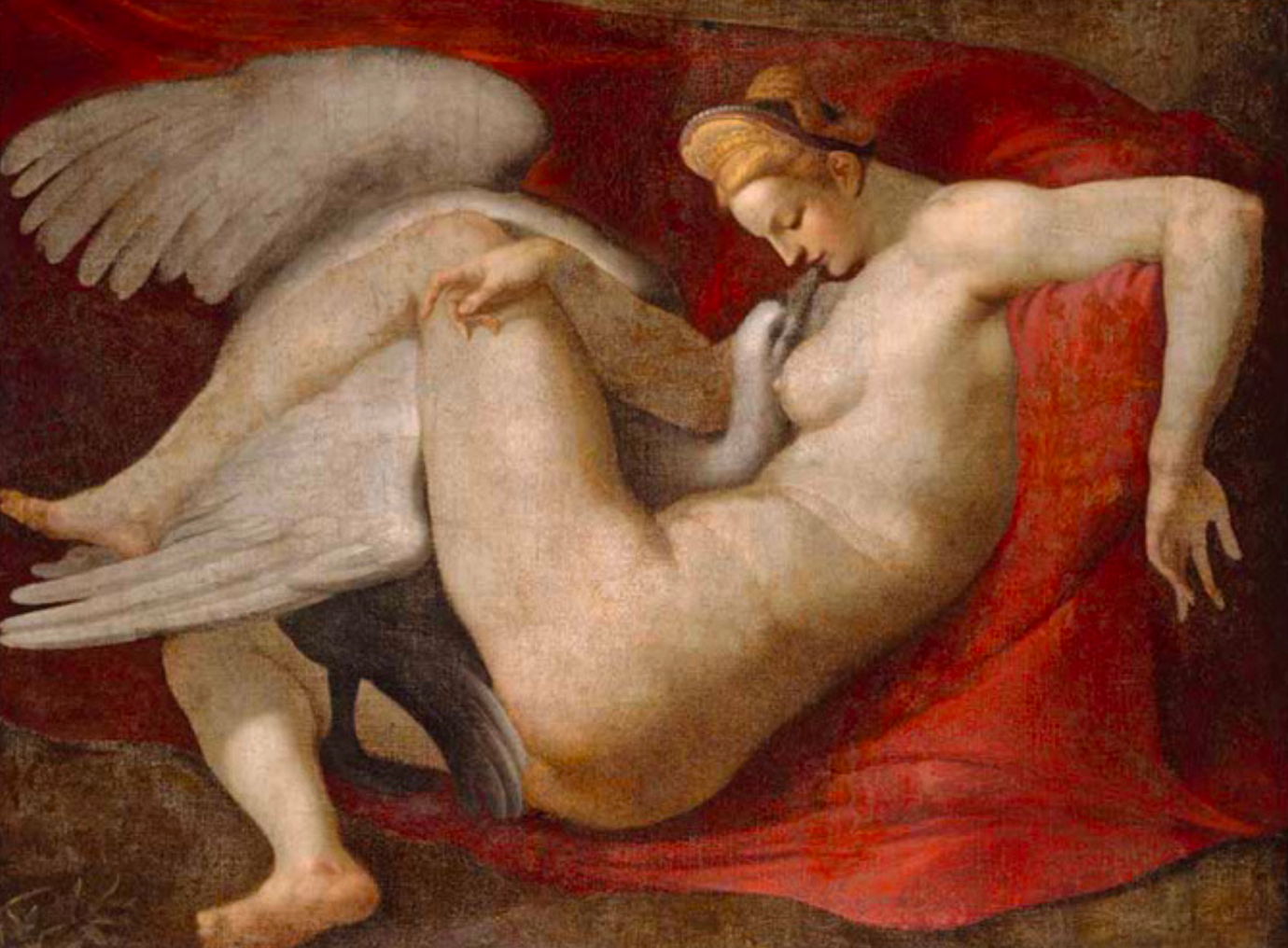
Leda and the Swan, 16th-century copy after the lost painting by Michelangelo
Helen, of course, like her mother, was not renowned for her great virtue and faithfulness. Pursued by a great many princes, she married Menelaus, King of Sparta, but while he was away in Crete to bury his uncle, Crateus, she fell for the handsome Trojan Prince, Paris, who was paying Sparta a fleeting visit, and sailed off with him, thus causing the first recorded war between the Greeks and the people of what is now Turkey. The mighty walls of Troy, incidentally, were, according to legend, built by Poseidon, the god of the sea, a job for which he was never paid, which is why he sided with the Greeks in the ten-year war. Many a jobbing builder would sympathise. He had an interesting talent, too: when he shook his trident it caused earthquakes or storms. Helen’s face seems to have launched not only a thousand ships but also a seemingly endless succession of conflicts and the deaths of millions, spread over a great many years. Not bad going for a girl who hatched from an egg and whose dad was a long-necked bird of the genus cygnus, at least part of the time. Those ancient Greeks really knew how to have fun, didn’t they?

Kastellorizo Island © Wikicommons
Now it’s all kicking off again around the Eastern Mediterranean, but not over a pretty face this time. It’s about gas, at least in theory, and the discovery of vast undersea reserves around Cyprus and near to the tiny island of Kastellorizo. Other factors are involved as well, though, not least national pride and the balance of powers around the Mediterranean. The fact is that the price of gas has gone down by almost 50% over the last decade and some big energy companies are putting off further drilling, reluctant to invest in an industry whose prospects for making a profit have dwindled, at least for now, but that hasn’t much impeded the dash for energy. Writing in the on-line news service ‘The Conversation’, Clemens Hoffmann, Lecturer in International Politics at the University of Stirling in Scotland, expresses his mild surprise at the tensions: “It may seem a strange time to be fighting over gas when prices remain in a slump due to weak demand and investors withdrawing.”
The existence of COVID-19 is making things worse, too. However, there is no doubt that the demand for gas will eventually recover, despite the European Union’s much-vaunted ‘Green Deal’ with its investment in renewables. And it’s been estimated that the gas reserves so far discovered in the Eastern Mediterranean are worth trillions of dollars, even at today’s fallen prices. Europe needs gas and is understandably uneasy about relying on Russia as its main supplier. Now, as in ancient times, Greece and Turkey disagree wildly about who owns what in that troubled bit of sea. The problem is that they are extremely close to one another, with nominally Greek islands very close to the Turkish shoreline and Greece believes they’re all entitled to their own continental shelf and the concomitant drilling rights. Kastellorizo is part of the Dodecanese group and is only two kilometres from Kaş in southwest Turkey, although it’s 570 kilometres from Athens. Kaş used to be regarded as being within the Greek sphere of influence once upon a time, being built on the site of Antiphellos and boasting a number of ancient ruins, including Lycian tombs and a theatre.
Greece believes all of its islands – including Kastellorizo (population: under 500) – should have the right to their own Exclusive Economic Zones – territorial waters, in fact – but in the case of Kastellorizo, those territorial waters would theoretically stretch right up the beach of Kaş, a Turkish holiday destination in its own right, to take in several hotels and a number of gift shops, which would clearly be impractical. Who wants to have to produce a passport just to buy a postcard or a bucket and spade for the kids? In fact, the proposed boundary is within easy pedalo-boat distance from the north-eastern beach of Kastellorizo, but an EEZ of its own, which Athens would like and which Washington supports, if not very firmly, would put a large hole in Turkey’s own continental shelf and sphere of maritime influence.
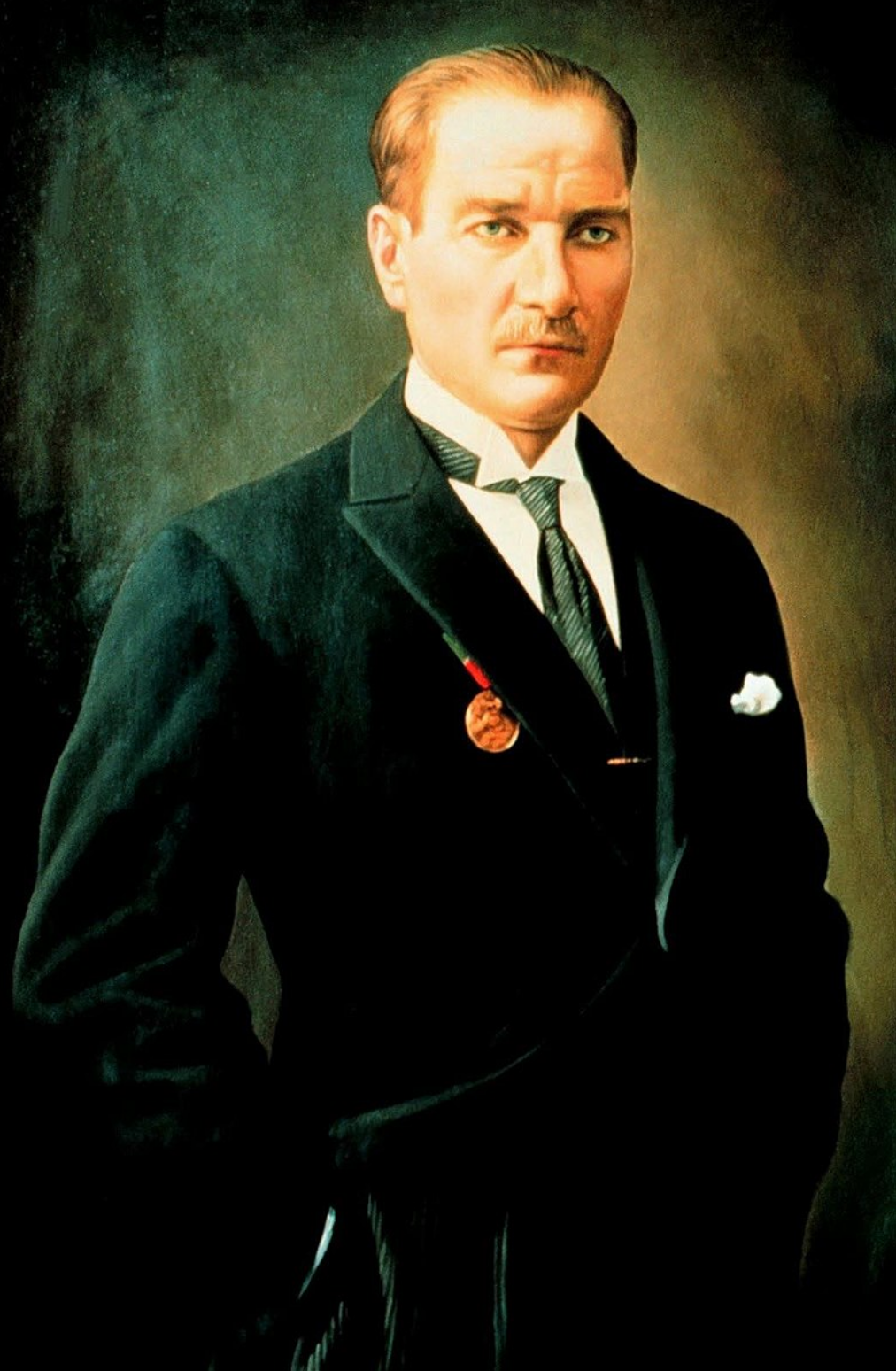
President of Turkey and Turkish Armed Forces Commander-in-chief Mareşal Mustafa Kemal Atatürk with the Medal of Independence, Ankara, 1925
Turkey claims that the waters around Cyprus are within its Exclusive Economic Zone (EEZ), although both Greece and the EU disagree.
Turkey’s current President, its twelfth, is the bullish Recep Tayyip Erdoğan, a man of ambition who seems set on turning his country from the secular path mapped out by Mustafa Kamâl Atatürk and back towards its more aggressive, warlike past in the heady days of the Ottoman Empire. Atatürk was an astute man who wanted Turkey to be seen as a modern country and who was wary of those who saw themselves as ‘men of destiny’.
Years ago, while filming in Ankara, I visited Atatürk’s tomb and the adjacent museum, which contains mementos and pictures of the great man with various leaders of the time, together with his thoughts about them. After meeting Adolf Hitler, he predicted that Germany’s new Chancellor would lead the world into war, and he urged caution in dealing with him, which means he saw more clearly than many of his contemporaries.
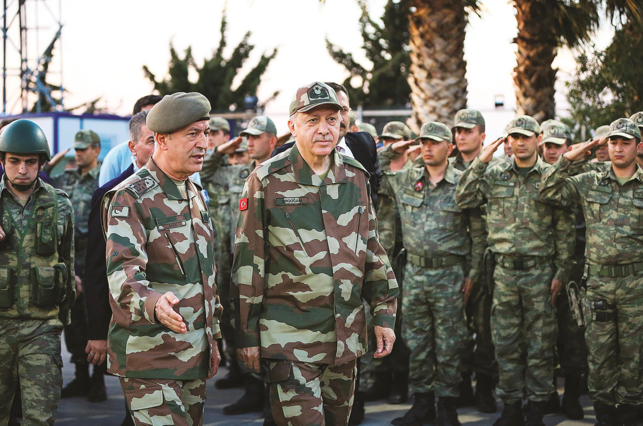
Turkish President Recep Tayyip Erdogan in military uniform © Alraimedia
But Erdoğan seems prepared to cajole and threaten his allies to get his own way, knowing that as far as the EU is concerned, he has a winning hand: Turkey could close its vast refugee camps and help thousands of refugees get to Europe, much to the disquiet of many European citizens and the probable fall of a few governments. The plain fact is that there are some vast gas reserves under the Eastern Mediterranean, while Turkey and Greece lay claim to territorial waters that overlap; a recipe for disaster. No wonder Poseidon seems to be shaking his trident.
UNLIKELY ALLIANCES
The Turkish drilling ship Oruç Reis, currently exploring the waters near Cyprus, has a Turkish naval escort and Erdoğan has warned that anyone seeking to interfere with its work will pay “a heavy price”. This follows a collision between a Turkish Frigate, the Kemal Reis, and an elderly Greek warship, the Limnos. France has sent two Rafale fighter jets to Crete to support Greece, as well as two warships of its own, on what President Macron called a “temporary basis” and as a warning to Erdoğan, while Chancellor Merkel of Germany (currently holding the Presidency of the EU’s rotating European Council) has been trying to get the parties around a negotiating table. The maritime collision infuriated Erdoğan, who said that Turkey will retaliate if there are further incidents. Two people who must surely be laughing at all this brewhaha are Vladimir Putin, and Xi Jinping.

Turkish Petroleum International Company © tpic.com
After all, all the countries involved in the fracas are members of NATO and when allied opponents fall out and bicker, the main beneficiaries must be Russia and China, along with a few anti-Western groups and nations. Boko Haram and Al-Shabaab, among others, must be splitting their sides. But it’s not funny. Not in the least. It could disrupt the balance of global powers in and around the Mediterranean and lead to a conflict in which people will die.
It’s not just Turkey and Greece, either. Cyprus and Egypt are also involved. Cyprus, to continue the classical theme, was supposedly the birthplace of Venus and is alleged to have given its name to the metal copper, which was mined there from ancient times. But it was the invasion in 1974 as Turkey sought to forestall an attempted coup d’état by Greek Cypriots wanting their island to become part of Greece that still rankles. The Turkish Republic of Northern Cyprus is only recognised as an independent state by Turkey but is symbolic of the tensions between the two countries. It’s hard to see how the issue could be resolved. Egypt comes into the story of the Trojan War, too, as the place where Paris and Helen were shipwrecked on their way home to Troy. Some versions argue that they saw out the war there, making it very difficult for King Priam to return Helen to the angry Greeks (or Achaeans, to be more precise) since she was in another country and being held against her will. These days, Egypt has two large plants capable of turning natural gas straight from the undersea reserves into liquified natural gas (LNG) that can then be shipped to whichever country wants to buy it. But unlike previous squabbles (historical or possibly just literary) there’s no sign of romance in the current troubles, no gods doing horrible things to ordinary mortals, nor handsome warriors skulking off with beautiful young women or building large wooden horses.
There is enough drama here, though, to keep a latter day Homer busy for months or years. The row over the exploitation of gas supplies has moved on from being an extension to the permanent disagreement over Northern Cyprus, because Turkey’s drilling vessels have moved on from the Northern Cyprus coast to other parts of the sea. Turkey claims exploitation rights on the grounds that it sees the entire area as being its continental shelf and therefore part of its EEZ. As mentioned earlier, Greece sees all of its islands as also having their own EEZs, a claim strongly disputed by Ankara. If Greece’s claims were to hold sway, Turkey’s rights to exploit undersea resources would be restricted to a very small area centred on the Gulf of Antaly, which would clearly be unjust. In 2019, Turkey signed an EEZ agreement with the Libyan Government of National Accord (GNA) which, if implemented, would mean that the Greek island of Crete has no continental shelf of its own and therefore no territorial waters. I can recall paddling with my wife in what’s called the Libyan Sea, off Crete’s southern coast, and I would have been miffed if a Turkish drilling ship had shown up to exploit resources there at that moment. Greece’s claim to the seas around its many islands is based on the UN Convention on the Law of the Sea, but Turkey is not a signatory. Turkey has agreed an EEZ with Greece, though, as well as one with Egypt. It’s not an issue that’s going away, either, as the Washington Post reports: “Moscow is eyeing a possible military base along the oil-rich shores of Libya. China is seeking investment deals across the region. Turkey is clashing with NATO partner Greece over drilling rights and militarized islands. Newly discovered offshore natural gas deposits have nations scrambling to stake their claims. Even the Trump administration on Wednesday partially lifted an arms embargo with Cyprus in what was widely interpreted as a shot across Turkey’s bow.”

Turkish Navy © Tsk.tr
The whole issue has become a big mess and a very dangerous one. After all, Turkish forces are also active in Iraq, where they are conducting large-scale military operations against the Kurdish Separatist group, the PKK. And as if that was not enough, Libya is involved, too, as is Syria. But Libya is, perhaps, the main reason (or one of the main reasons, anyway) for growing tensions. Libya is split into two opposing camps. In the west, the country is ruled from Tripoli by a government that has UN recognition. Turkey supports it, but France, Russia, Egypt and the United Arab Emirates, (UAE), – yet another player in this deadly game of musical chairs – support the group holding the east of the country and ruled by Khalifa Haftar. France sees Haftar as a possible bulwark against Islamic extremists and its biggest oil company, Total, is a major investor in oilfields situated in areas he controls. Haftar almost took Tripoli in 2019 but was held back by the arrival of weapons, troops and Syrian mercenaries sent by Turkey to support the official government.
NOW READ ON…
The whole affair is such a mess that it really needs explanation, rather like in those “the story so far” sections that often precede an episode of an especially convoluted television soap opera. First of all, let’s just set aside previous conflicts between Greece and Turkey, except for the issue of Cyprus, which is key to many of the subsequent difficulties. Back in 1974, the then Greek government, specifically the far-right ‘Colonels’ who had seized control in Greece, backed an attempted coup d’état in Cyprus, aimed as bringing it wholly within the control of Athens. This move, called enosis, was favoured by most Greek Cypriots after years of rule by Britain; they also voted to reject a peace plan put forward in 2004 by the then UN Secretary General Kofi Annan, although Turkish Cypriots voted in favour. At the time of the coup, and fearing that Turkish citizens on Cyprus would get the same raw deal they had received on other predominantly Greek islands, Turkey launched an invasion and created a de facto independent state, albeit one only recognised by Turkey. There are citizens in both parts still smarting over properties lost in the other part. It is, of course, possible to cross that strictly controlled UN buffer zone (I’ve done that, with a German television team) but by and large, North Cyprus (approximately a third of the island) is noticeably less wealthy than the south. Both are friendly, however, despite the vast Turkish flag on a hillside overlooking the neighbours to the south. One thing I noticed there was that old Orthodox churches are still standing in Northern Cyprus, despite being out of use, while many of the mosques in the south have been demolished. Just as the internationally recognised government of Cyprus is not recognised by Turkey or North Cyprus, the government there – only recognised by Turkey – does not acknowledge the government of the South. Meanwhile, much of the world seems to have forgotten just how awful Greece’s ‘colonels’ were, running a military dictatorship in the home of what was and is the world’s oldest democracy.
We move forward to a decade or so ago, when large reserves of oil and gas were discovered under the Eastern Mediterranean. Great news for many situated in the region (especially energy-starved Israel) but inevitably the touch-paper for an explosion, too.

Turkish research vessel Oruç Reis © ekathimerini.com
It was not surprising, therefore, that Turkey’s decision to send an exploration vessel into waters claimed by both countries (or all three, if you count Cyprus) would cause a tiff. In fact, it’s being reported that the two NATO allies are closer to outright war now than at any time since the Cyprus invasion in 1974. Erdoğan’s aggressive assertiveness is certainly not helping to keep the peace. He is to peace-keeping what a flame-thrower is to an ice cream sundae. Into this explosive mix add the agreement signed by Israel, Greece and Cyprus to create an East Mediterranean pipeline to exploit the gas and sell it to the EU, very deliberately excluding Turkey and Northern Cyprus. But drilling for gas or oil, especially under the sea, requires massive up-front investment, not to mention risk. Remember Deepwater Horizon? Or Piper Alpha in the North Sea? Or how about the Seacrest Drillship, in the South China Sea, off Thailand? Expensive in terms of human life and for the oil and gas companies and investors, just massively expensive.
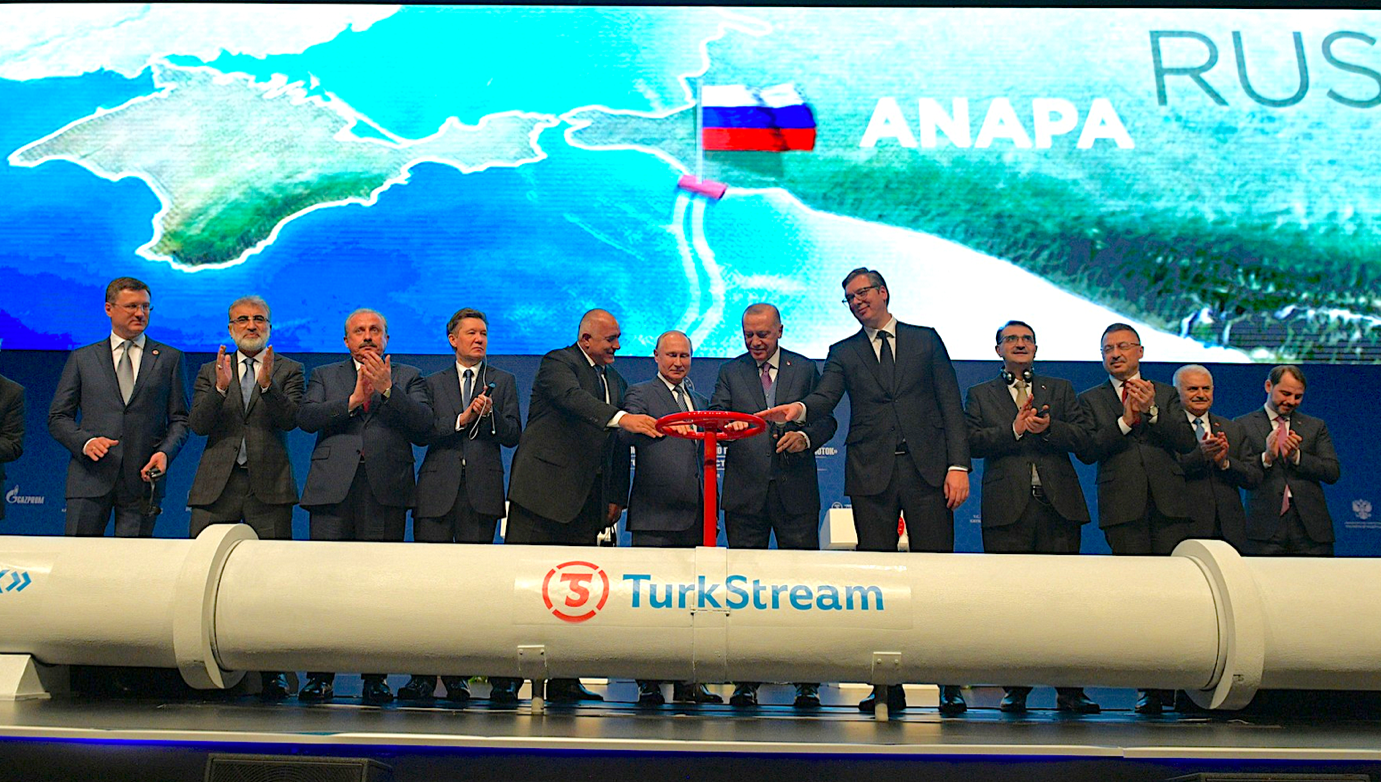
Vladimir Putin and Recep Erdogan at the ceremony to launch TurkStream gas pipeline. The ceremony was also attended by President of Serbia Aleksandar Vucic and Prime Minister of Bulgaria Boyko Borissov © kremlin.ru
And in fact, Israel seems to be putting its faith in solar energy, of which it has a potentially huge supply. Furthermore, the 1,900 kilometre undersea pipeline required to transport the gas – all 10-billion cubic metres (BCM) of it would need to go at depths of up to three kilometres through an area famed for earthquakes. According to The Economist, most analysts reckon that the estimated cost of $6-$7-billion (€5-€6-billion) is optimistic. But Turkey needs foreign exchange to bulk out its falling currency, the Turkish lira, so it sees its activities as ‘defensive’, not aggressive.
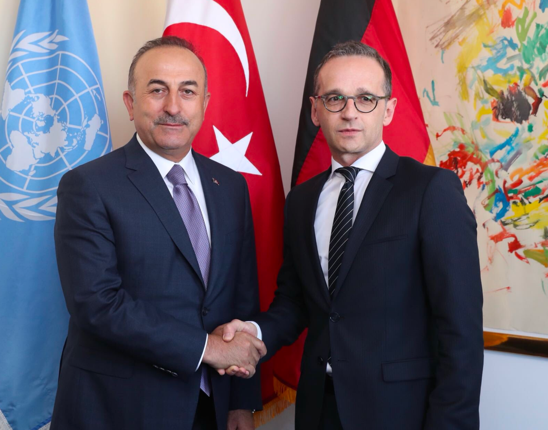
Turkish Foreign Minister Mevlüt Çavuşoğlu and German Foreign Minister Heiko Maas @ MevlutCavusoglu
But it is certainly expansionist, even introducing its currency into the parts of northern Syria under its control, despite the lira losing some 19% of its value since the start of this year. On the day of writing, it fell to 7.418 to the US dollar on morning trading in Istanbul, recovering slightly later. To cheer up the Turks, JPMorgan have started recommending that investors should use their greenbacks to buy the lira, arguing that the pressure to sell may be coming to an end. The credit ratings agency Moody’s, though, has said in a report that Ankara may need to revise its economic policies. “The policy mix that has fed the current economic situation,” says the report, “credit-driven growth, monetary policy accommodation despite high inflation rates, and support to the domestic currency will likely be difficult to sustain for long if the external demand environment remains challenging.” Another credit ratings agency, Fitch, lowered its outlook on Turkish sovereign debt from ‘stable’ to ‘negative’ in the light of the central bank’s depleted foreign currency reserves and low interest rates, rating Turkey’s debt at BB-, which means junk

Turkey needs foreign exchange to bulk out its falling currency, the Turkish lira © tcmb.gov
Turkey’s benchmark interest rate stands at 8.25%, while annual consumer inflation is 11.8%, resulting in real rates being in negative territory, like the central bank’s foreign currency reserves.
Clemens Hoffmann, Lecturer in International Politics at the University of Stirling in Scotland, writing in ‘The Conversation’, reckons this whole business of sabre-rattling at sea is simply about getting a seat at the negotiating table for Erdoğan, although it seems possible his ambitions stretch further than that.

Clemens Hoffmann, Lecturer in International Politics at the University of Stirling © Stir.ac.uk
And as the Greek and Turkish navies conduct rival exercises in the disputed area, Turkish Foreign Minister Mevlüt Çavuşoğlu told journalists that Turkey was ready to “do whatever is necessary, without hesitation.” Çavuşoğlu was speaking at a news conference with German Foreign Minister Heiko Maas, who was visiting the two capitals in a bid to ease the standoff over territory and oil and gas exploration rights. Maas warned both sides to avoid any military confrontation, but neither seems to be paying much attention.
Aggression has already paid off for Turkey. Erdoğan persuaded General Haftar to halt his western advance in return for the UN-recognised Libyan government agreeing to Turkey’s claims to establish EEZs in the Mediterranean, which, incidentally, ignore the existence of Crete and Rhodes and cutting across the proposed route for that pipeline.
UNLIKELY ALLIES
Turkey’s unbridled aggression has had the strange side-effect of creating an unlikely alliance of countries wary of its ambitions. In Europe, France, Greece and Cyprus have been building friendships with Egypt, the UAE and Israel, which was once an ally of Turkey. Turkey has lost other friends, too.
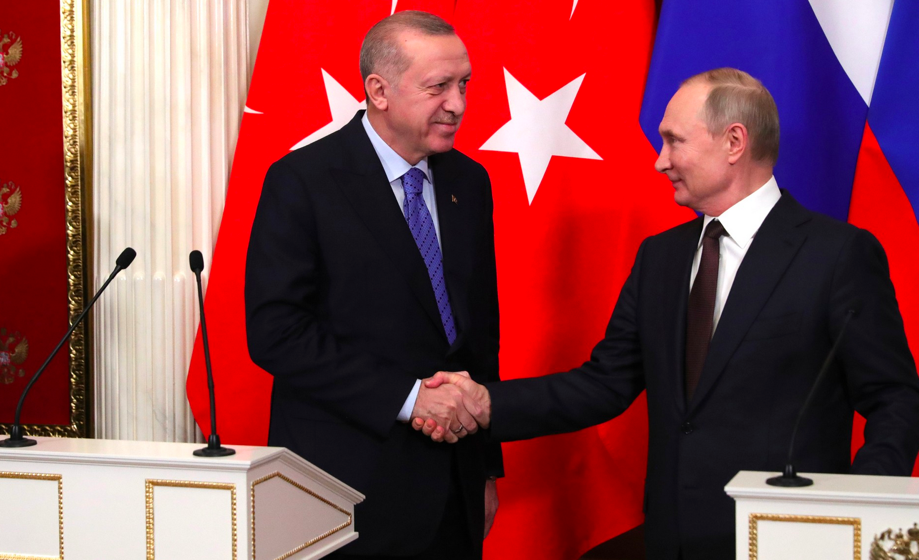
Recep Erdogan and Vladimir Putin
Because it chose to buy Russia’s S-400 air defence system, despite objections from NATO, Washington removed Turkey from its programme to buy the Lockheed Martin F-35 multi-rôle combat aircraft, which it is selling to the UAE, much to Israel’s annoyance and concern. Mind you, Donald Trump has never shown much understanding of the complicated territorial issues in the Mediterranean. With a presidential election looming, his interest in the region is likely to dwindle further, despite Exxon-Mobile’s interest in the waters off Cyprus. That serves to worsen the situation on the ground and increase the risk of adventurism by the parties involved. Meanwhile, French President Emmanuel Macron was quick to visit Beirut following the ammonium nitrate explosion and to promise – together with the UAE – to co-fund repairs, beating Turkey to it. France now has military agreements with the UAE, Greece, Cyprus and Egypt, all keen to rein in Erdoğan. Germany, as usual, is playing peace-maker, trying to prevent the disagreements over rights and zones of influence from flaring up into something worse.
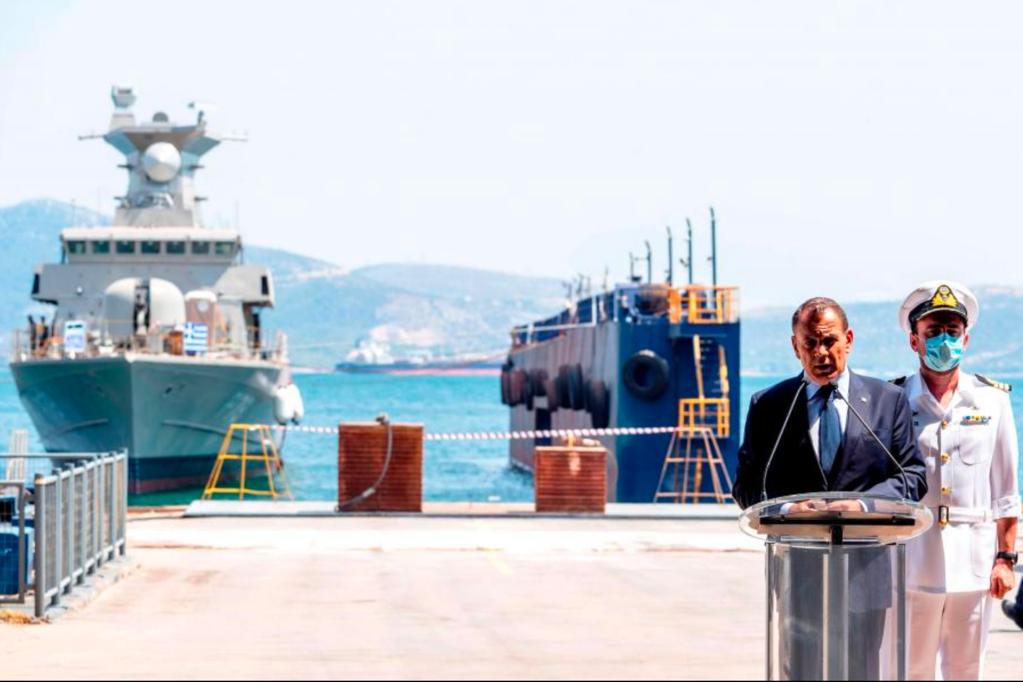
The Greek Minister of National Defence Mr. Nikolaos Panagiotopoulos at the launching ceremony of Guided Missile Fast Patrol Vessel no. “7” © mil.gr
Meanwhile, Greek naval vessels and aircraft have been conducting live fire exercises close to where Turkey’s Oruç Reis is prospecting for hydrocarbons, to the south-east of Crete. But the Hellenic Armed Forces (HAF) are fairly small and are outgunned by Turkey. Writing in Global Security Review, Jack Dulgarian points out that the HAF are outmatched in terms of size, capabilities and technology. “I posit a scenario,” he writes, “wherein Turkey decides to act on its territorial claims on the Greek islands of the Mediterranean Sea. In such a scenario, Ankara displays both the willingness and capability to carry out (through) a thorough examination of some of HAF’s operational shortcomings, finally, what Athens can do to close the widening security gap with its hostile neighbors.” Not much, it seems.
This brings us back to the tiny island of Kastellorizo, granted (along with the even tinier Strogelli and Ro) to Greece under the 1947 Treaty of Paris, having formerly been controlled by Mussolini’s Italy. Greece wants an EEZ that is four times the area of the island itself, which Turkey opposes, saying that islands cannot impose EEZs. The Turkish Foreign Ministry said: “The islands cannot influence the coastal projection of Turkey, the country with the longest coastline in the Eastern Mediterranean and that the islands on the opposite side of the middle line between two mainland areas cannot create maritime jurisdiction beyond their territorial waters.”
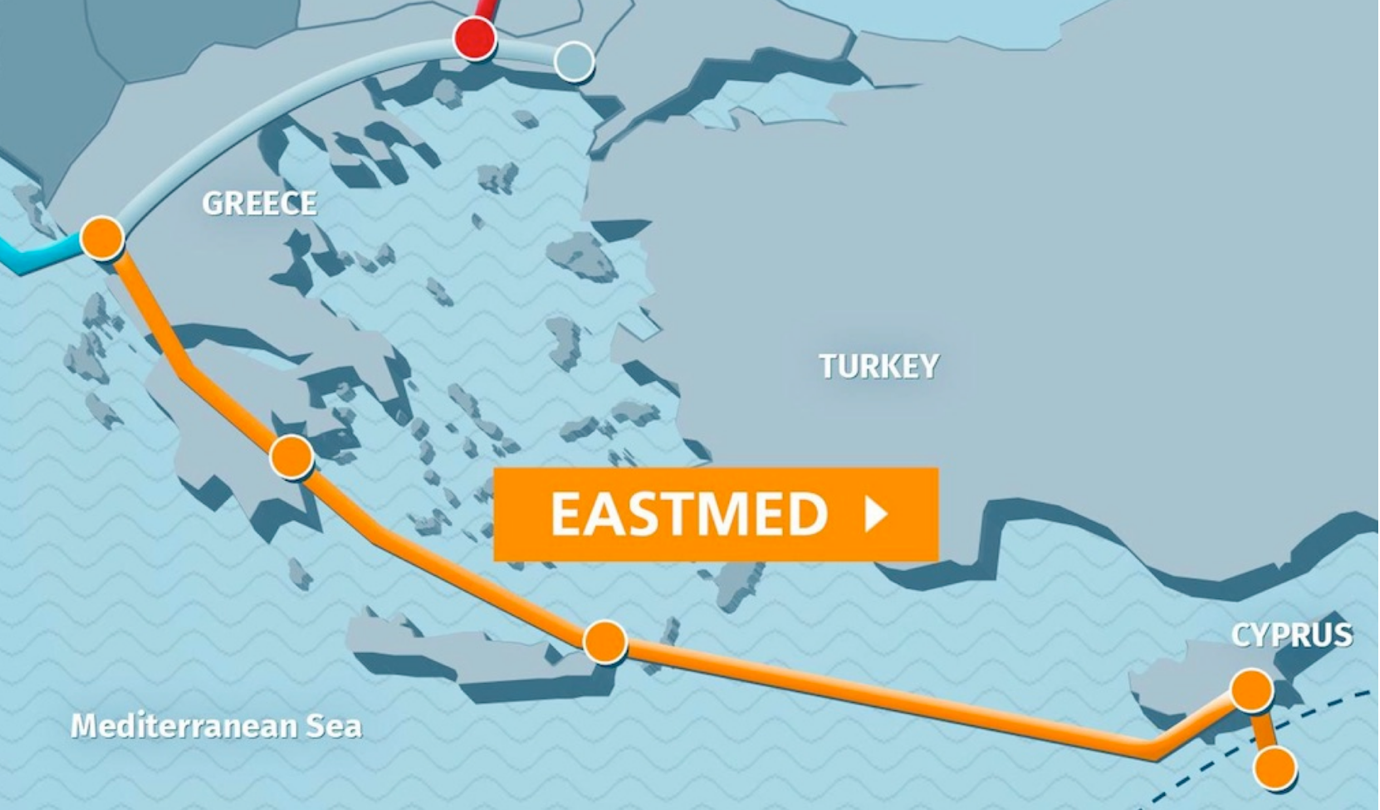
Eastern Mediterranean (EastMed) is a 1,900 kilometers long natural gas pipeline project to connect the gas reserves of the eastern Mediterranean to Greece © energyegypt.net
That ignores the fact that Turkey signed a deal with the UN-recognised Libyan government in Tripoli to create an EEZ from Turkey’s south coast to the north-east coast of Libya. It totally ignores the existence of Crete, a Greek island, bang in the middle. Greece called it “absurd”, Egypt called it “illegal”, but licences have been granted to Turkish Petroleum to drill in the Eastern Mediterranean, including just off the coasts of Crete and Rhodes. Turkey claims to be acting within the UN’s Law of the Sea, even though it’s one of the countries that has not signed the convention. At a press conference, Erdoğan promised that international efforts would not stop Turkey from conducting energy research in the disputed areas. “We will not back down in the face of sanctions and threats,” he said. “We will never bow to banditry on our continental shelf.” Not much room for compromise there. Both Greece and the EU have said the drilling is illegal, but Turkey isn’t listening.
According to German Foreign Minister Heiko Maas, however, there is a ray of hope. He has been trying through negotiation to improve relations and move towards talks. Maas has shuttled between Athens and Ankara in a bid to get the sides to cool the rhetoric and re-enter direct talks. Afterwards, Maas conceded that the dispute had entered a “very critical” phase, but he added that “no one wants to solve this issue in a militaristic way, and there is a willingness for dialogue on both sides.” That, I’m afraid, looks like wishful thinking. There’s no obvious sign of a willingness for dialogue or compromise.
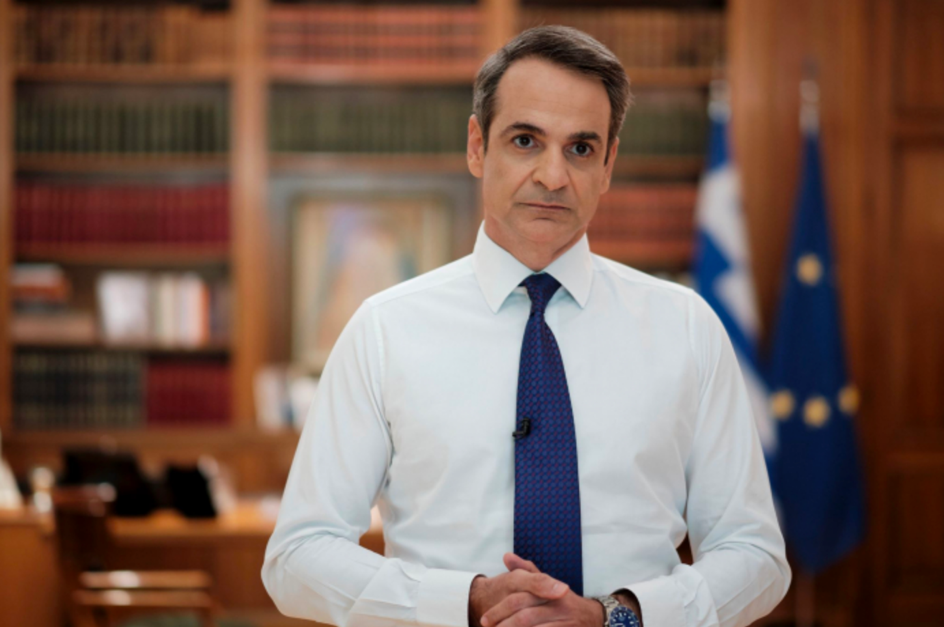
Greek Prime Minister Kyriakos Mitsotakis © Primeminister.gr
Greek Prime Minister Kyriakos Mitsotakis has announced plans to extend his country’s territorial waters almost twenty kilometres into the Ionian Sea, despite the appeals of Maas and others to calm the situation. Speaking to journalists, Erdoğan gave a forceful response. “Turkey will take what rightfully belongs to it in the Black Sea, the Aegean and the Mediterranean Sea,” he said. “Just as we don’t set our sights on anyone else’s land, we won’t make any concessions regarding what belongs to us. That’s why we are determined to do whatever it takes, economically, politically and militarily.”
WHAT THE PAPERS SAY
A leading Turkish newspaper, Hürriyet Daily News, has argued for a moratorium to give room for discussion, although that seems unlikely to happen, despite the best efforts of Germany. A German paper, Frankfurter Rundschau, says it’s too late for appeals. “There is no sign of anyone who could de-escalate the tensions between the Turks and the Greeks,” it wrote. “In recent decades this role has fallen to the Americans, but US President Trump is no mediator. So Europe is on its own. However, so far Turkey seems unimpressed by the military presence of the French and the diplomatic efforts of the Germans.

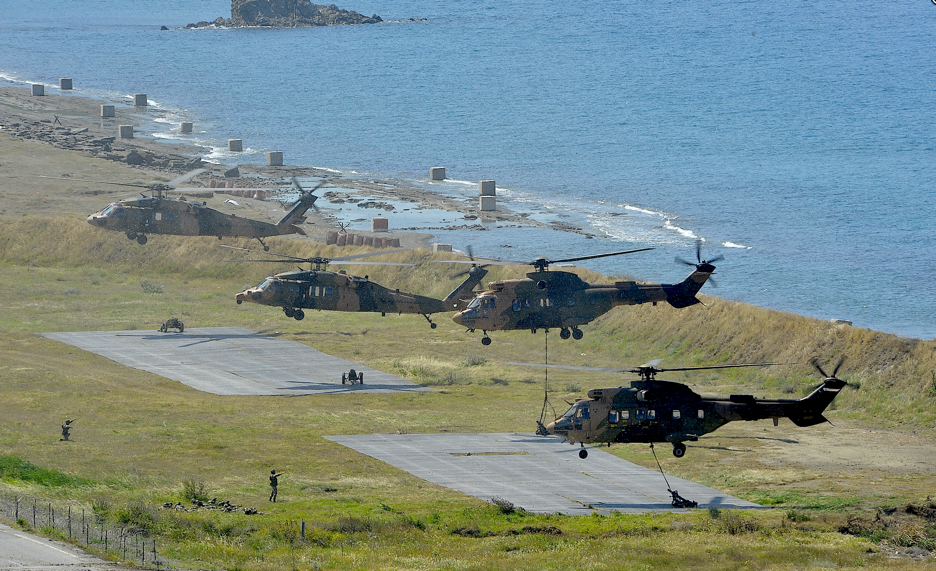
TAF Commander Yaşar GÜLER tsk.tr
German Foreign Minister Heiko Maas was forced to conclude in Athens and Ankara that appeals alone will not defuse this conflict. The EU must no longer shy away from the debate about sanctions against Ankara.” Austria’s Die Presse sees the biggest problem as Erdoğan himself. “The open provocations and sabre-rattling against Greece by means of Erdoğan’s so-called research vessel,” it writes, “show that neither Trump, nor China, nor Putin’s Russia are currently the greatest threat to Europe. It is Erdoğan’s Turkey that is blatantly challenging Europe in the Aegean, Syria and Libya. His message: you depend on us because of the refugees and you may soon also be militarily inferior to us. We are the new hegemonic superpower in the Mediterranean.”
It’s a somewhat bleak conclusion. Turkey’s T24 news site, which has also claimed that Turkey is no longer a democracy, is not hopeful but sees other motives at work, beyond the issue of undersea energy reserves. “Between Turkey and Greece it is difficult, not to say impossible, to apply the concept of the continental shelf as it is defined in international law,” writes the controversial and often-jailed playwright Aydin Engin. “What’s more, the expression ‘exclusive economic zone’, which appears frequently in the recent agreement between Libya and Turkey, is a term from international maritime law that is difficult to implement in the Aegean and Eastern Mediterranean. All of these issues are creating uncertainty and causing difficult diplomatic discussions, unilateral action, tensions and empty threats between Greece and Turkey. And they act like fertiliser for nationalism in both countries. And both countries are using these debates to cover up internal problems and distract the people.”
It remains a huge problem for the EU, as if it didn’t already have enough of those. What with the United Kingdom quitting the bloc without a trade deal in sight, other groups pressing for Italy to leave as well, together with the continuing COVID-19 pandemic, the constant breaching of EU rules by Poland and Hungary and an aggressive Russia and China, it’s hard to see what options are open to EU leaders in pouring oil on the troubled waters of the Eastern Mediterranean and Aegean Sea. It may change after the US elections, especially if Joe Biden becomes president. He has shown a greater interest in and understanding of global affairs than the current incumbent. It’s been suggested that Turkey’s aggression is partly fuelled by the knowledge that Washington is unlikely to intervene with Trump at the helm. Poseidon seems to be not only shaking his trident but also laughing his socks off. According to Homer he and his brother Zeus were on opposing sides. Zeus wanted the Trojans to win while Poseidon favoured the Greeks, but one of the reasons the principal gods favoured a war at all was to rid the world of the demigods, who were a threat to them. There’s always an underlying reason, if you look. Today, of course, it’s not Trojans and Lycians against Achaeans and Cretans, it’s Turks versus Greeks, and Erdoğan seems to be adhering to the advice in the Iliad (translation by Robert Fagles) that the Trojan Hector gave to Polydamas, who was concerned with bad omens: “Fight for your country – that is the best, the only omen!” But of course, the Trojans lost, if only through the trickery of the wooden horse. As Virgil wrote in his version of the Trojan War story, the Aeniad: “Do not trust the horse, Trojans. Whatever it is, I fear the Greeks, even when they bring gifts.”
Click below to read the 2020 September edition of Europe Diplomatic Magazine

